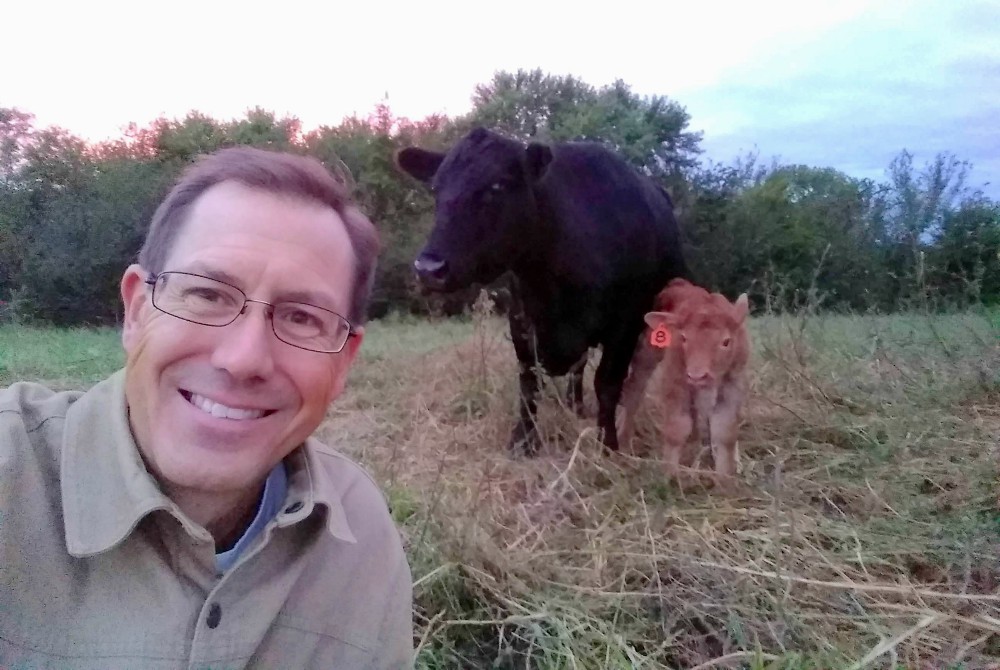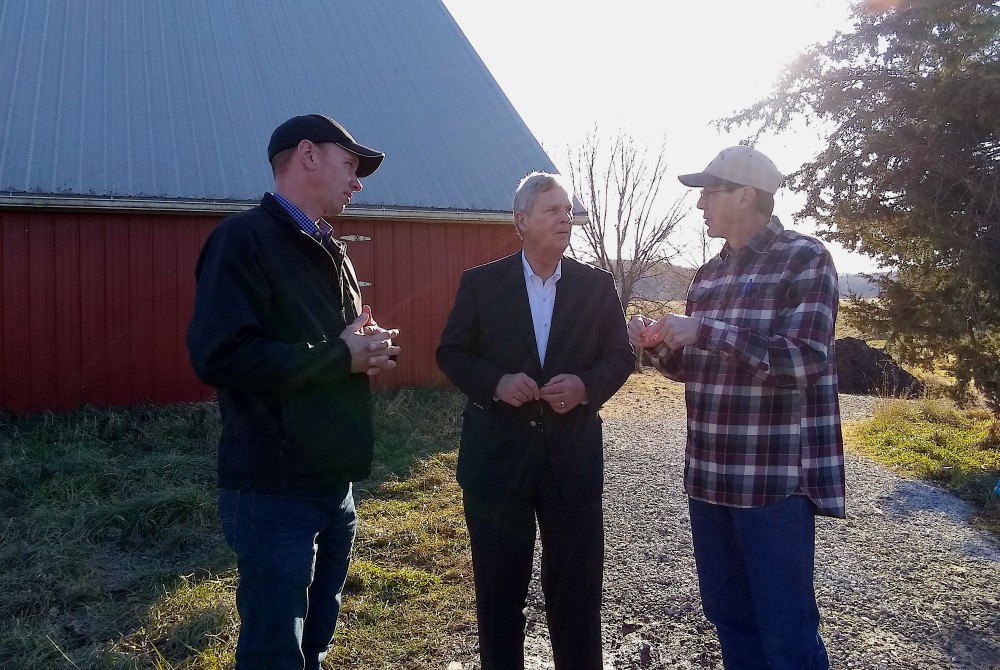
Matt Russell with a newborn calf and its mother on his farm (Provided photo)
Matt Russell thought his calling was to become a priest. He spent the first decade of his professional life either in the seminary or practicing ministry.
But the last semester before he left the seminary, Russell worked on a project focused on urban sprawl that questioned humankind's relationship with the Earth.
"How are we living in creation, with the creator, and what choices are we making?" Russell asked. "There was a real strong sense of discipleship that was coming out of [the project]."
That feeling led Russell, a fifth-generation farmer, back into the world of agriculture. As the executive director for Iowa Interfaith Power and Light, Russell has combined his faith and environmentalism to become a national leader in the push to use agriculture as a climate change solution.
Russell's work is somewhat grounded amid the coronavirus pandemic — he and Iowa Interfaith Power and Light staff are working from home for now. For the agriculture community he works with, the outbreak brings questions of all kinds.
"There's just a lot of uncertainty," he said in a telephone interview Friday. "It's all disruptive." Farmers don't know what people will eat in a pandemic — will they opt for less costly chicken or pork instead of beef? And farmers, in general, trend older. What happens if farmers get quarantined in their homes or become sick?
Russell said it doesn't feel proper to insert his mission into the COVID-19 crisis at this point. But he is hopeful that when the U.S. comes out of this pandemic, leaders and the general public will be better positioned to take on the climate crisis.
"Now, what is hopeful is that leadership's responding to moral and scientific issues," he said. "People can rise to the occasion if they have the context to do that."

Matt Russell talks with Tom Vilsack, center, secretary of agriculture under President Barack Obama, and his neighbor and fellow farmer Justin Jordan, left. (Provided photo)
Farmers are often labeled as culprits in climate change. The food system causes nearly 40% of greenhouse gas emissions under some estimates, with agriculture the main contributor.
But Russell sees regenerative agriculture as a way to reverse the trend. He's taken his message far and wide, last year writing in The New York Times and testifying before the U.S. House Select Committee on the Climate Crisis.
In an interview, Russell said: "Farmers are the ones who are closest to the land, who can implement the changes that science is saying that we need."
Regenerative agriculture includes five main facets: using clean energy on farms, implementing conservation tillage, integrating livestock into crop farming, growing permaculture (cover crops are most commonly known) and extending the crop rotation.
"We have to grow a bigger variety of things," Russell said, and grow them year-round.
The regenerative practices Russell describes are a sea change from the past century of agriculture. Farming in the fossil fuel era has been about extracting from the land — raising as much meat, corn and soybeans as possible.
And the economic pressures on farmers were more focused on making money than keeping the land and those who tend it healthy. Russell saw that on his father's farm growing up in western Iowa.
"As my dad built his farm up, he was listening to these voices of cultural formation that were all selling him something," Russell recalled.
Overall, the practices Russell advocates fight against the status quo and encourage farmers to work in greater harmony with the Earth.
Advertisement
Consider cover crops: Planting a cover crop rather than corn or soybeans takes business away from the massive companies that sell corn and soybean seeds, the chemicals that help them grow, and the machinery required to raise them. Plus, cover crops can mean less immediate revenue for the farm.
However, switching row crops like corn and soybeans to a cover crop can reduce erosion, rejuvenate the soil's nutrients and make it more fertile for the next time the land sees corn or soybeans.
Convincing people to make the investment in regenerative farming practices can be difficult, and farmers have largely been slow to adopt them.
Russell said religion can be key in helping people understand the benefits in making a change.
"It's a moral dilemma," he said. "Really, the core is we aren't living in the right relationship with each other and with creation, or the environment."
To help farmers come around, Russell runs them through a line of questions like this:
- How is God calling you as a farmer, or what's your vocational call?
- In this climate crisis, how is God calling you to become a part of the solution?
- What're the things that are preventing you from responding to that call?
- What would it take to change those things?
It's a successful pitch.
"I haven't had one farmer tell me no," Russell said. "Every single farmer has said, 'Yeah, I'm interested in that.' "
Russell is convinced the next 20 years are crucial for the planet's long-term health, and climate scientists agree.
"How do we transition to the next era of living together on the planet?" he said. "The world needs on-farm innovation."
On the farm Russell owns with his husband, there's a barn that was built in 1930. Inside sit five stalls for draft horses.
The people who built the barn, Russell said, were betting that horse-and-harness were the future of farming.
We know better now. And we know farming practices, among plenty of other things, must change rapidly in the next decades.
"The question is," he said, "will we do it?"
[Cody Nelson is a former reporter/digital producer for Minnesota Public Radio who works now as a freelance journalist in Santa Fe, New Mexico. Follow him on Twitter: @codyleenelson.]





